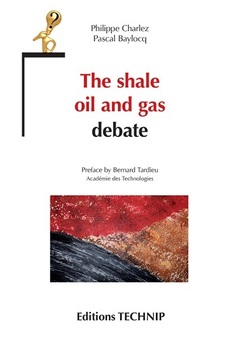Description
The shale oil and gas debate
Authors: BAYLOCQ Pascal, CHARLEZ Philippe
Language: French
Subject for The shale oil and gas debate:
25.00 €
In Print (Delivery period: 7 days).
Add to cart
Publication date: 05-2015
232 p. · Paperback
232 p. · Paperback
Description
/li>
In the space of six years, the united States have reduced their dependence
on oil by a third and have become almost self-sufficient in terms of gas
supply. This “shale oil and gas revolution”, a sudden and unexpected
earthquake in the energy world, enabled the US to become one of the most
competitive countries in the world. Exporting this revolution could double
the world gas reserves and boost those of oil by 20%. Outside North
America, the main reservoirs are thought to be in China, Russia and
Argentina.
In the medium term, this new state of affairs will have >major geopolitical consequences, fundamentally altering oil, gas and coal imports. While US imports from the Persian Gulf rapidly dwindle, those of China and India will significantly increase and as the United States becomes a gas exporter, Russia will have to find alternative markets. Although it is not ranked in the “top 10”, Europe is thought to have vast resources. Yet for the realization of a major European project, a number of geological (are European source rocks as high quality as their US counterparts?), economic (will Europe be able to develop its resources at an acceptable cost?) and societal barriers will have to be overcome. On a densely-populated, urban continent, hydraulic fracturing, water supply, microseisms and surface impact represent a battery of “threats” for the stakeholders. Changing this perception will require both pedagogy and transparency regarding the local communities. This has to be a win/win situation and not a case of give and take.
In this work, written in the form of 20 questions for non-specialists, Philippe Charlez and Pascal Baylocq give you the answers to “ everything you always wanted to know about shale oil and gas but never dared to ask.
In the medium term, this new state of affairs will have >major geopolitical consequences, fundamentally altering oil, gas and coal imports. While US imports from the Persian Gulf rapidly dwindle, those of China and India will significantly increase and as the United States becomes a gas exporter, Russia will have to find alternative markets. Although it is not ranked in the “top 10”, Europe is thought to have vast resources. Yet for the realization of a major European project, a number of geological (are European source rocks as high quality as their US counterparts?), economic (will Europe be able to develop its resources at an acceptable cost?) and societal barriers will have to be overcome. On a densely-populated, urban continent, hydraulic fracturing, water supply, microseisms and surface impact represent a battery of “threats” for the stakeholders. Changing this perception will require both pedagogy and transparency regarding the local communities. This has to be a win/win situation and not a case of give and take.
In this work, written in the form of 20 questions for non-specialists, Philippe Charlez and Pascal Baylocq give you the answers to “ everything you always wanted to know about shale oil and gas but never dared to ask.
© 2024 LAVOISIER S.A.S.

